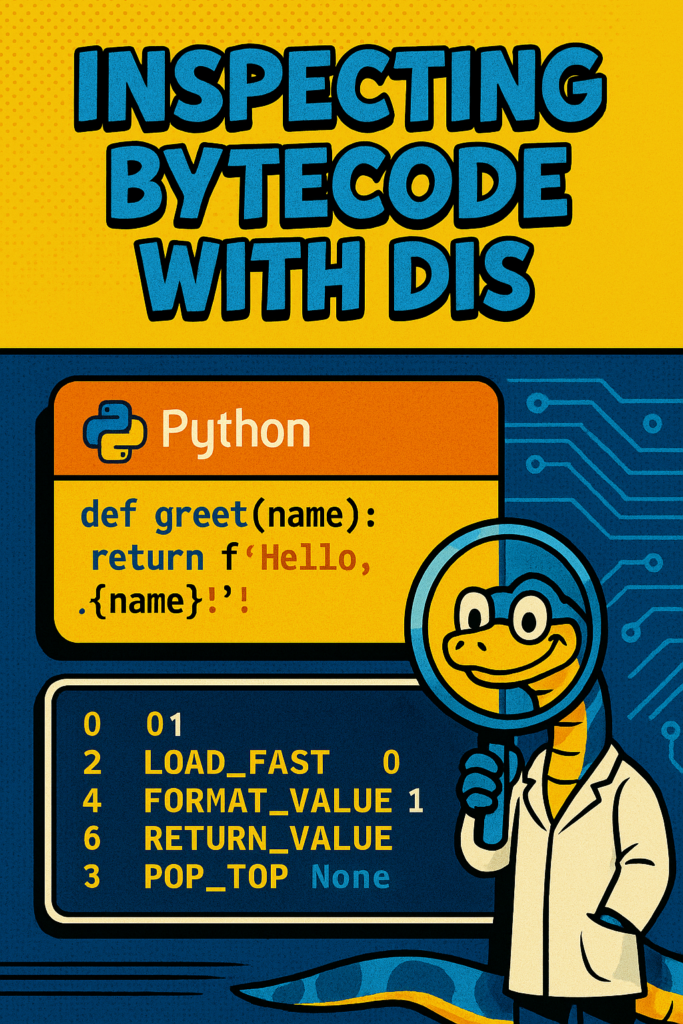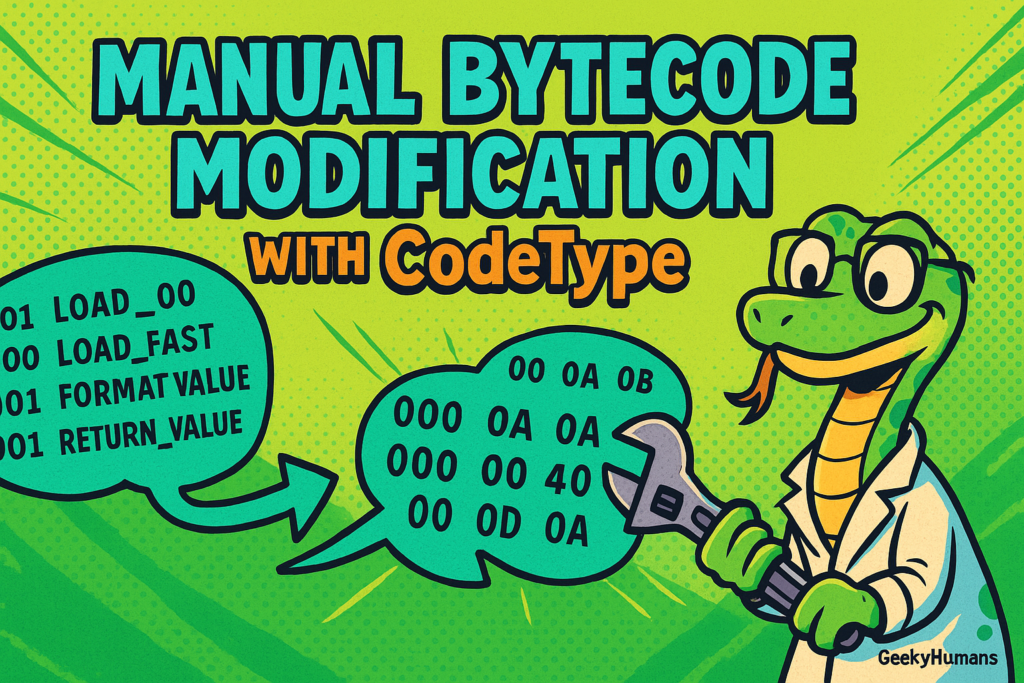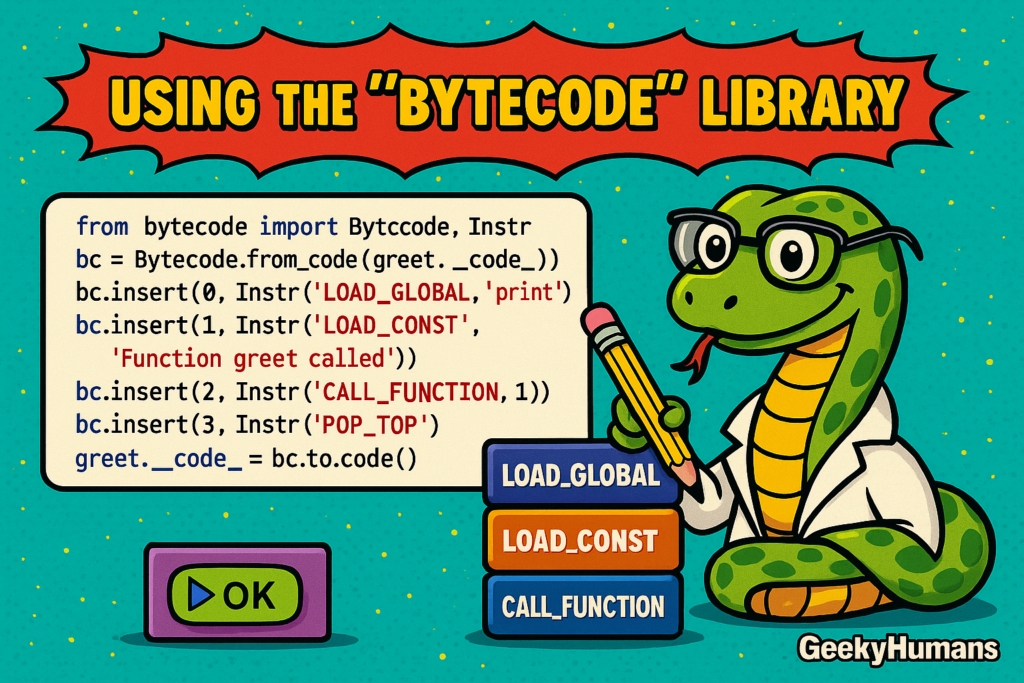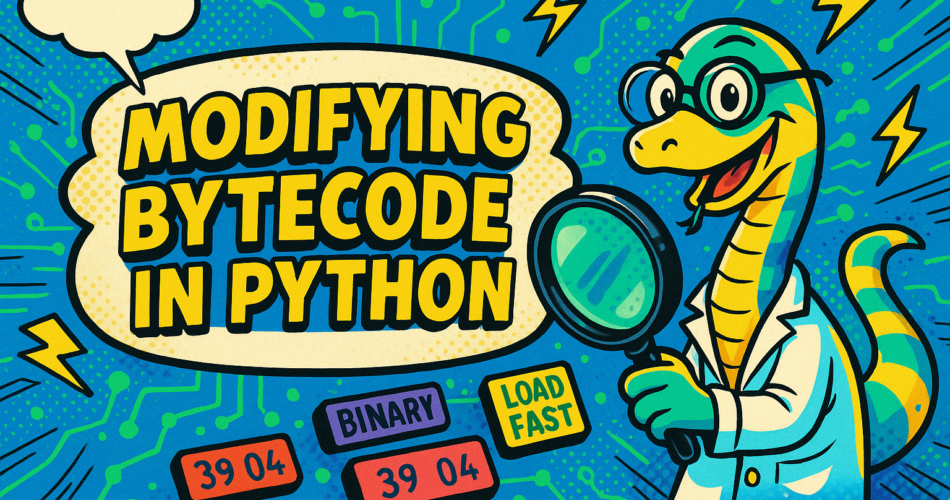Modifying Bytecode in Python unlocks powerful metaprogramming capabilities—letting you inject profiling hooks, instrument functions, and even build custom optimizers without touching source files. In this comprehensive guide, you will:
- Learn how to inspect Python bytecode
- Modify and reconstruct
codeobjects for live instrumentation - Use the
bytecodelibrary for safer transformations - Discover best practices and real-world caveats
Embed the keyword “Modifying Bytecode in Python” early and often for SEO impact.
Why Modify Bytecode in Python?
Modifying bytecode enables:
- Profiling & Logging Hooks: inject monitors without changing source.
- Aspect-Oriented Programming: wrap cross-cutting concerns around functions.
- Custom Optimizations: rewrite hot code paths for performance.
- Dynamic Patches: apply live fixes or features at runtime.
Prerequisites
Before diving into Modifying Bytecode in Python, ensure you have:
- Python 3.8 or newer installed
- Familiarity with Python functions and modules
- Basic understanding of the Python VM and
__code__objects
Inspecting Bytecode with dis

Use the built-in dis module to view bytecode instructions:
import dis
def greet(name):
return f"Hello, {name}!"
dis.dis(greet)
Key Points:
dis.dis()shows opcodes likeLOAD_FAST,FORMAT_VALUE,RETURN_VALUE.- Helps you visualize what the interpreter executes under the hood.
Understanding code Objects

Every Python function has a __code__ attribute. Inspect these fields:
co_code: raw bytecode as bytesco_consts: constants tupleco_names: accessed global namesco_varnames: local variable namesco_freevars/co_cellvars: closure varsco_firstlineno: original source line
code_obj = greet.__code__
print(code_obj.co_consts, code_obj.co_names)
Manual Bytecode Modification with types.CodeType

Rebuild a code object to change literals or opcodes:
import types
orig = greet.__code__
new_consts = tuple(
"Hi there, {}!" if isinstance(c, str) and "Hello" in c else c
for c in orig.co_consts
)
new_code = types.CodeType(
orig.co_argcount,
orig.co_posonlyargcount,
orig.co_kwonlyargcount,
orig.co_nlocals,
orig.co_stacksize,
orig.co_flags,
orig.co_code,
new_consts,
orig.co_names,
orig.co_varnames,
orig.co_filename,
orig.co_name,
orig.co_firstlineno,
orig.co_lnotab,
orig.co_freevars,
orig.co_cellvars,
)
greet.__code__ = new_code
print(greet("Alice")) # Hi there, Alice!
Code Explanation:
- You’re replacing the
co_conststuple inside thecodeobject. - Everything else remains unchanged, preserving function behavior.
High-Level Manipulation using the bytecode Library

The bytecode library simplifies bytecode edits:
pip install bytecode
from bytecode import Bytecode, Instr
bc = Bytecode.from_code(greet.__code__)
bc.insert(0, Instr('LOAD_GLOBAL', 'print'))
bc.insert(1, Instr('LOAD_CONST', 'Function greet called'))
bc.insert(2, Instr('CALL_FUNCTION', 1))
bc.insert(3, Instr('POP_TOP'))
greet.__code__ = bc.to_code()
greet("Bob")
Code Explanation:
Bytecode.from_code()parses raw bytecode into an editable list of instructions.- Inserting instructions at index
0prints before function logic. bc.to_code()exports a newCodeTypefor the function.
Live Instrumentation Techniques
Automatically instrument modules on import:
import importlib.util
from bytecode import Bytecode, Instr
def instrument_module(name):
spec = importlib.util.find_spec(name)
module = importlib.util.module_from_spec(spec)
spec.loader.exec_module(module)
for attr in dir(module):
fn = getattr(module, attr)
if callable(fn) and hasattr(fn, '__code__'):
bc = Bytecode.from_code(fn.__code__)
bc.insert(0, Instr('LOAD_GLOBAL','print'))
bc.insert(1, Instr('LOAD_CONST',f"Entering {fn.__name__}"))
bc.insert(2, Instr('CALL_FUNCTION',1))
bc.insert(3, Instr('POP_TOP'))
fn.__code__ = bc.to_code()
return module
Best Practices & Caveats
- Compatibility: lock Python version; bytecode format changes.
- Performance: measure overhead; avoid heavy instrumentation in hot paths.
- Security: never modify untrusted code—risk of code injection.
- Debugging: always verify with
disafter transformations.
Next Steps & Resources
- Explore peephole optimizers to enhance CPython’s engine.
- Combine with profilers for targeted instrumentation.
- Contribute to Bytecode or Codetransformer on GitHub.

